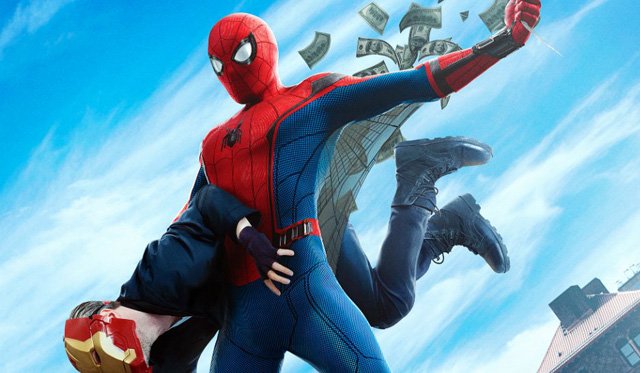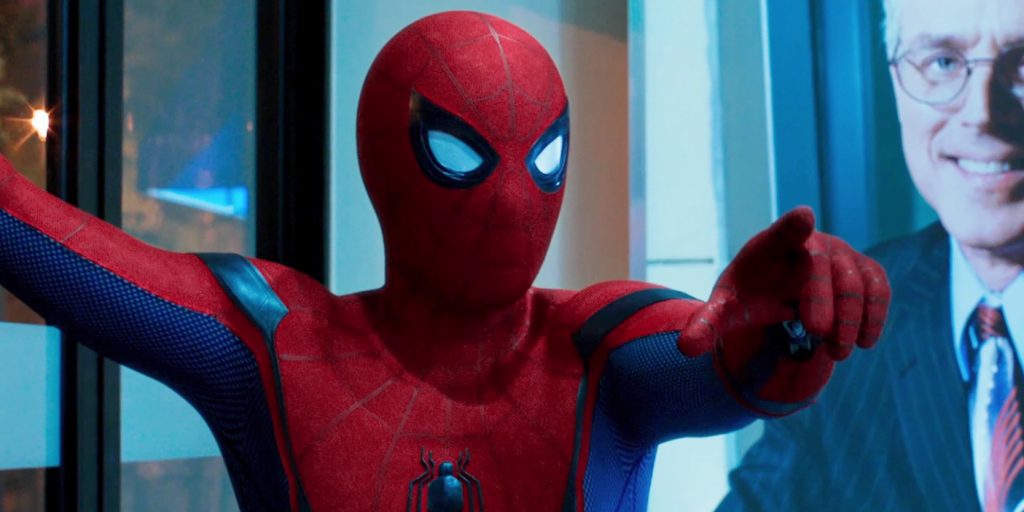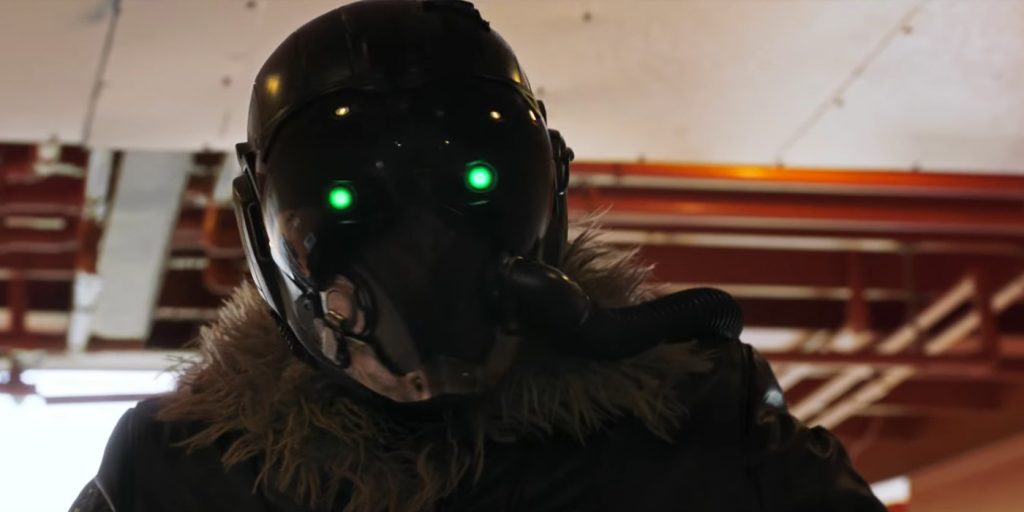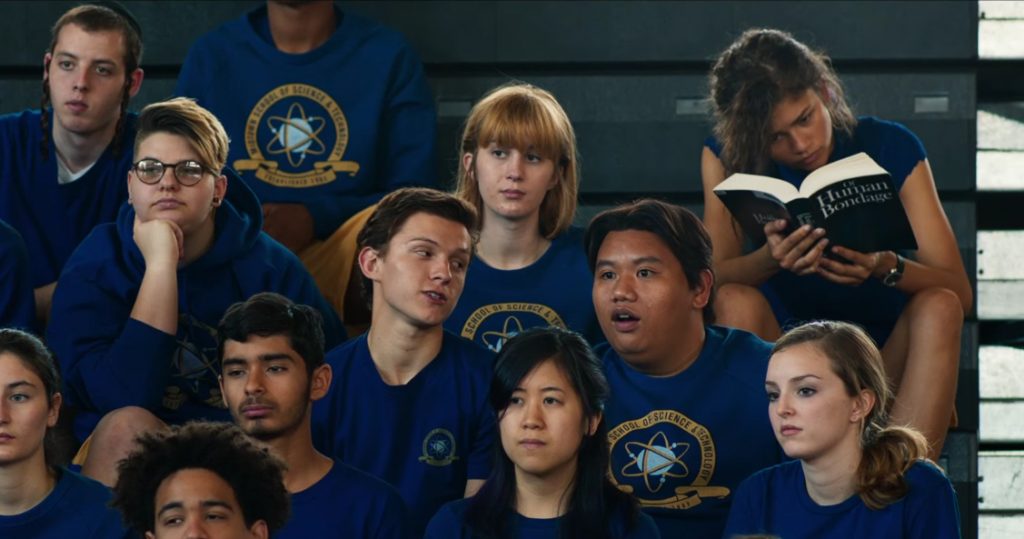
I’m of the persuasion that there are basically three types of superhero yarn. The first is the Chosen One, God on Earth, who defends the weak masses from fantastic threats–so, your Superman. The second is the descendent of noir, detective stories, a melodrama that can reach anywhere from the dirtiest grimiest alley to a James Bond-style worldwide caper–but not farther. This style is where Batman lives. Finally, you have the style that Stan Lee and Steve Ditko created for Spider-Man in 1962. It’s a little of both, and yet neither, for while the hero has powers far beyond a mere mortal’s, changing the entire world is beyond them, and so the drama comes from their ability to balance their fantastic life and their normal life. Spider-Man is the avatar of coming-of-age superhero storytelling.
Spider-Man: Homecoming — from Cop Car director Jon Watts — is not the first Spider-Man movie that understands this. But as the latest in the countless hours of entertainment of the Marvel Cinematic Universe, it expresses this principle more joyously and fully than ever, through contrast to what came before. Marvel Studios did not yield to the temptation of bringing in a Spidey-like character in the not-so-distant past when Sony seemed to have the franchise locked down. So there is no other MCU joint that takes place in a high school, with a young adult protagonist. There’s no other movie in their repertoire that substantially explores the drama of secret identity, which Superman did first but Spider-Man did best.
And through serendipity, Spider-Man: Homecoming became a unique opportunity in the history of the character. You see, “youth” is more or less a theme that Spider-Man exists to explore, but in the real world, Spider-Man is older and more famous than almost any other Marvel hero. So in the comics Peter Parker is kind of shoved into this niche that he doesn’t rightfully fit, which at its best leads to innovations like Miles Morales, the second Spider-Man, and at its worst leads to trash like “One More Day,” in which Peter Parker sacrifices his marriage and unborn daughter to The Devil.
But thanks to the rights situation with Sony, Marvel Studios is now introducing a teenage Peter Parker to a mature storytelling universe built on nearly decade-long careers of Iron Man, Thor, Nick Fury et al. Peter Parker actually is the boy superhero who looks up to idols, and for once the idols have naturally earned that admiration.

All of this has not yet said anything, per se, about the quality of the film. But I’m here to tell you that the immense storytelling potential set up by the entrance of Tom Holland’s Spider-Man into Civil War has not gone to waste. I cannot remember once before in my life sitting through a feature film with a dopey grin on my face almost the ENTIRE time. There’s a bit where everyone in my packed theater gasped. Spider-Man: Homecoming recognizes the importance of joy to the experience of the superhero, in much the same way that Wonder Woman reminded us of the importance of hope.
In an appropriate flip-flop of the billing of Batman ’89, we actually first meet Michael Keaton’s character Adrian Toomes, known in the comics as The Vulture. Now Vulture’s claim to fame is that he was Spider-Man’s first real supervillain opponent, and that he’s an old man. So one might say he’s been literally grandfathered in to incarnation after incarnation of Spider-Man, with no truly memorable story resulting that I am aware of. Well, Keaton’s Toomes doesn’t exactly start off where you’d expect, and he doesn’t end up where you’d expect either. Keaton transforms the character no less than Tom Hardy transformed the character of Bane; an instant icon that transcends its basis. Toomes is deeply tied into the framework of the MCU, which might tweak Spidey purists but which I think is very important. Thematically and structurally, Parker’s first villain can’t be already obsessed with him. He needs a hook in another part of the storytelling universe. Keaton effortlessly blends wounded pride, populist fury, vicious intelligence, and even a sort of paternal instinct, making Toomes more rounded and human than even several of the Avengers are to date.

After meeting Toomes, we flash forward to a retelling of the events of Civil War from Peter’s perspective. While the sequence is unbelievably funny and entertaining (reintroducing Jon Favreau’s Happy Hogan, a welcome presence throughout the film who ties us firmly back to the original Favreau-directed Iron Man), it’s not very newbie-friendly and it would have been nice for this film to be a good on-ramp to Marvel and Spidey in addition to everything else it excels at. On the other hand, the MCU has had a lot of success by eschewing exposition and just expecting audiences to hop on board. The benefit of this approach is that we blessedly skip over Uncle Ben and all the other stuff from Amazing Fantasy #15 that feels stale from being adapted two to three times this decade. But the drawback is that the superhero portions of the movie are essentially an Iron Man/Captain America spinoff, instead of standing alone like Ant-Man, Doctor Strange, or Guardians of the Galaxy.
That said, once we are introduced to our hero and our villain, the movie settles into its major narrative thread, which is essentially Peter champing at the bit in high school. The beauty of a high school setting is that nearly everyone in a position to see the movie can relate to it. As with this summer’s Power Rangers, Watts’ film embraces John Hughes-style drama, comedy and romance (with a well-timed allusion to Ferris Bueller to boot). A few welcome updates to Spider-Man’s traditional supporting cast keep the interest level up–who expected to see a non-white, non-huge, intellectual Flash Thompson, who’s still effectively Peter’s tormentor?
Robert Downey’s redoubtable Tony Stark represents what Peter wants but can’t have yet–success, freedom, and fortune. If that means being a superhero, well that’s just how it works in this setting. Of course, Downey continues to fit the role like a glove, continuing the character’s arc despite very limited screen time. You can tell a consummate actor when they enhance a less-experienced lead rather than upstaging him. Downey’s generosity elevates Holland, who is about to get a hell of a lot of leading-man offers. Significantly, at the beginning of the film, Stark says Parker’s a better man than him, but doesn’t believe it; at the end, he believes it without having to say it. Peter takes charge of his own growth as a man without even realizing it.

That’s the meat of the sandwich, but you’re really here for the fixings. Jacob Batalon is a great sidekick as Ned, who expresses the audience’s joy at superheroics when Peter’s unable. Zendaya’s an intriguing presence as the mysterious Michelle, a foil in every way to Parker’s traditional crush, Liz (Laura Harrier). Donald Glover steals the show in two scenes, and the revelation of who exactly he’s playing is incredible for those who know his history with the Spider-Man character. Toomes and his colorful crew are often hilarious, a welcome reminder that effective villains don’t have to be sucking the life from the Earth or some shit. In a welcome move, Peter’s high-tech suit gets its own “JARVIS”-like AI that allows him to get a lot of his traditional commentary and snark on from the comics without monologuing. And while the film doesn’t lack for action, the focus is on imaginative staging rather than trying to top the bombast of Sony’s previous five Spider-outings. The film does mine some iconic Spider-Man moments from the comics that Sony hadn’t gotten to already, reminding us that the Spider-tapestry is vast enough for countless entries in the saga without reinventing the wheel.
Other than one element in the climactic battle that should have been left out due to visual confusion, and the fact that this is not a definitive, complete story of Spider-Man in the way that Raimi’s original was, there’s not a blessed thing wrong with this movie. Tom Holland as Peter Parker is exactly the breath of fresh air that the Marvel Cinematic Universe needed after eight years of billionaire cynics, turbo-powered godlings, and angst-ridden vigilantes. And it is exactly the history of the MCU to date, eschewing “no kill” heroes, that gives weight to Parker’s every act of mercy, making what is expected in Spider-Man comics a moment of profound power in Marvel films. In the same fashion, Keaton elevates the played-out concepts of both the Vulture character and the concept of a small-time supervillain gang. Spider-Man: Homecoming is therefore an expression of the maturation of the Marvel Cinematic Universe and a reconstruction of old-fashioned superhero storytelling. It is the ultimate expression of the joy of superheroes, combined with the timeless tribulation of coming of age.


Nice review! Best lines IMHO: “Spider-Man: Homecoming recognizes the importance of joy to the experience of the superhero, in much the same way that Wonder Woman reminded us of the importance of hope.” and “Toomes and his colorful crew are often hilarious, a welcome reminder that effective villains don’t have to be sucking the life from the Earth or some shit.”